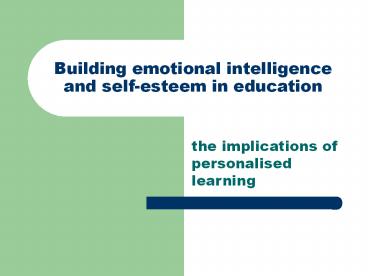Building emotional intelligence and self-esteem in education PowerPoint PPT Presentation
Title: Building emotional intelligence and self-esteem in education
1
Building emotional intelligence and self-esteem
in education
- the implications of personalised learning
2
Outline
- emotional dimensions in education
- self-esteem
- emotional intelligence and well-being
- some influences/sources
- personalised learning, personalised public
services - therapeutic culture
- some implications
- diminished aspirations?
- empowerment?
3
Emotional dimensions in education
- emotional intelligence self-awareness,
management of emotions, empathy, expression of
feelings, recognising the power of feelings - self-esteem self-worth, confidence, self-concept
- circle time in schools
- personal advisers for young people, personal
tutorials in colleges - diagnosis of EI and SE
- new labels vulnerable, fragile learners,
fragile identities, learners at risk - research interest identity, biography
4
Some reasons
- personalised public services
- reaching a disaffected public through emotional
engagement - concerns about social exclusion and disaffection
from formal education - therapeutic culture
- therapeutic interventions in all areas of life
and public policy - a mindset, symbols and language that constructs a
new form of subjectivity - cultural preoccupation with the diminished self
5
Therapeutic culture
- cultural, social and political beliefs that life
has become hard to handle - for some groups
- for everyone were all vulnerable and damaged
- the diminished self...characteristically
suffers from an emotional deficit and possesses a
permanent consciousness of vulnerability (Furedi,
2004 414). - distinction between legitimate, necessary therapy
and therapeutic culture/ethos
6
Some implications
- latest evangelical bandwagon or progressive
development? - lack of theoretical and empirical evidence for ET
and SE - influence of catalytic validity, Hawthorne
effect, evidence from practice and commercial
interests - abandoning educational goals for personal ones
- institutionalising the diminished self
- essentialising particular groups
- dubious and intrusive interventions
- reifying an endless quest to understand and
accommodate the emotional self - I feel therefore I am
- I am what my feelings are telling me
7
Challenging the new orthodoxy
- questioning the empirical and theoretical
evidence - locating EI and SE in a wider cultural and
political context - reinstating structural causes and effects of
social exclusion and resisting emotional ones - questioning therapeutic culture
- a culture becomes therapeutic when this form of
thinking expands from informing the role between
the individual and therapist to shaping public
perceptions about a range of issues. At that
point, it ceases to be a clinical technique and
becomes an instrument for the management of
subjectivity (Furedi, 2004, 413-414). - reasserting the importance of the rational

